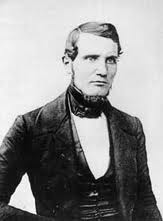Joseph Marie Élisabeth Durocher on:
[Wikipedia]
[Google]
[Amazon]
 Joseph Marie Élisabeth Durocher (31 May 1817,
Joseph Marie Élisabeth Durocher (31 May 1817,
 Joseph Marie Élisabeth Durocher (31 May 1817,
Joseph Marie Élisabeth Durocher (31 May 1817, Rennes
Rennes (; ; Gallo language, Gallo: ''Resnn''; ) is a city in the east of Brittany in Northwestern France at the confluence of the rivers Ille and Vilaine. Rennes is the prefecture of the Brittany (administrative region), Brittany Regions of F ...
- 3 December 1860, Rennes) was a French geologist.
Educated at the École Polytechnique
(, ; also known as Polytechnique or l'X ) is a ''grande école'' located in Palaiseau, France. It specializes in science and engineering and is a founding member of the Polytechnic Institute of Paris.
The school was founded in 1794 by mat ...
and École des Mines
École or Ecole may refer to:
* an elementary school in the French educational stages normally followed by secondary education establishments (collège and lycée)
* École (river), a tributary of the Seine flowing in région Île-de-France
* Éco ...
in Paris
Paris () is the Capital city, capital and List of communes in France with over 20,000 inhabitants, largest city of France. With an estimated population of 2,048,472 residents in January 2025 in an area of more than , Paris is the List of ci ...
, he qualified as a mining engineer. Early in his career he travelled in the northern parts of Europe
Europe is a continent located entirely in the Northern Hemisphere and mostly in the Eastern Hemisphere. It is bordered by the Arctic Ocean to the north, the Atlantic Ocean to the west, the Mediterranean Sea to the south, and Asia to the east ...
to study the metal
A metal () is a material that, when polished or fractured, shows a lustrous appearance, and conducts electrical resistivity and conductivity, electricity and thermal conductivity, heat relatively well. These properties are all associated wit ...
liferous deposits, and he contributed the articles on geology
Geology (). is a branch of natural science concerned with the Earth and other astronomical objects, the rocks of which they are composed, and the processes by which they change over time. Modern geology significantly overlaps all other Earth ...
, mineralogy
Mineralogy is a subject of geology specializing in the scientific study of the chemistry, crystal structure, and physical (including optical mineralogy, optical) properties of minerals and mineralized artifact (archaeology), artifacts. Specific s ...
, metallurgy
Metallurgy is a domain of materials science and engineering that studies the physical and chemical behavior of metallic elements, their inter-metallic compounds, and their mixtures, which are known as alloys.
Metallurgy encompasses both the ...
and chemistry
Chemistry is the scientific study of the properties and behavior of matter. It is a physical science within the natural sciences that studies the chemical elements that make up matter and chemical compound, compounds made of atoms, molecules a ...
to Paul Gaimard's ''Voyages de la commission scientifique du Nord de la Scandinavie, en Laponie, au Spitlberg et aux Feroe, pendant les annes 1838-1840''.
In 1844 he became professor of geology and mineralogy at Rennes. His attention was now largely directed to the study of the artificial production of mineral
In geology and mineralogy, a mineral or mineral species is, broadly speaking, a solid substance with a fairly well-defined chemical composition and a specific crystal structure that occurs naturally in pure form.John P. Rafferty, ed. (2011): Mi ...
s, to the metamorphism
Metamorphism is the transformation of existing Rock (geology), rock (the protolith) to rock with a different mineral composition or Texture (geology), texture. Metamorphism takes place at temperatures in excess of , and often also at elevated ...
of rocks
In geology, rock (or stone) is any naturally occurring solid mass or aggregate of minerals or mineraloid matter. It is categorized by the minerals included, its chemical composition, and the way in which it is formed. Rocks form the Earth's ...
, and to the genesis of igneous rock
Igneous rock ( ), or magmatic rock, is one of the three main rock types, the others being sedimentary and metamorphic. Igneous rocks are formed through the cooling and solidification of magma or lava.
The magma can be derived from partial ...
s. In 1857 he published his famous ''Essai de pétrologie comparée'', in which he expressed the view that the igneous rocks have been derived from two magma
Magma () is the molten or semi-molten natural material from which all igneous rocks are formed. Magma (sometimes colloquially but incorrectly referred to as ''lava'') is found beneath the surface of the Earth, and evidence of magmatism has also ...
s which coexist beneath the solid crust, and are respectively acid
An acid is a molecule or ion capable of either donating a proton (i.e. Hydron, hydrogen cation, H+), known as a Brønsted–Lowry acid–base theory, Brønsted–Lowry acid, or forming a covalent bond with an electron pair, known as a Lewis ...
and basic
Basic or BASIC may refer to:
Science and technology
* BASIC, a computer programming language
* Basic (chemistry), having the properties of a base
* Basic access authentication, in HTTP
Entertainment
* Basic (film), ''Basic'' (film), a 2003 film
...
.
References
* {{DEFAULTSORT:Durocher 1817 births 1860 deaths French geologists